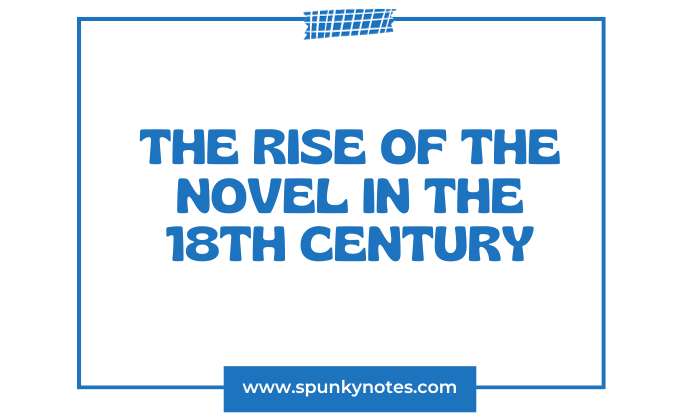
Q. Write a detailed note on the phenomenal rise of novel in the 18th century.
Background
Before the 18th century, storytelling was dominated by oral traditions, plays, and epic poems. The concept of a “novel” was not well defined, so writers did not prioritize this format.
They leaned towards well-established literary forms that were familiar and accepted. Moreover, In the past, people wanted stories with moral lessons or big heroes, not about everyday life like in novels.
This preference influenced writers to produce content aligned with those expectations, leaving the novel format largely unexplored.
Novels as we know them did not exist for the following reasons:
- Traditional Storytelling
- Limited Literacy
- Expensive Printing
- Society’s Preference
1- Traditional Storytelling
Back then, people told stories in a different way. People loved hearing tales through songs, plays, and poems. These were the main ways to share tales. Books that did exist were mainly religious, like the Bible or scholarly texts for the learned.
2- Limited Literacy
Only the wealthy and religious leaders usually got a good education and could read. So, books were rare and meant for the elite. So, people shared stories orally to ensure everyone could hear and enjoy them.
3- Expensive Printing
Printing books was expensive, too. The machines and methods used to make books were old and slow. Publishers could only produce a few book copies, and they were expensive.
4- Society’s Preference
Lastly, society valued stories of great heroes, kings, and gods. People did not consider stories about ordinary people and daily life important enough to write down.
So, before the 18th century, the focus was on something other than novels. The times, the technology, and society’s values made it challenging for novels to emerge.
However, as all these factors began to change, the stage was set for the rise of the novel in the 18th century.
The Rise of Novels in the 18th Century
The 18th century was a special time for books. Before this, most people read poetry or plays. However, during this century, novels became very popular.
These were stories about common people, not just heroes or kings. More people learned to read, and books became cheaper, which helped this change.
It was also a time when many famous writers started writing novels. These books changed how people thought and what they liked to do for fun.
Why Novels Became Popular
Novels became famous for several reasons, which can be broadly categorized as follows:
- The Rise of the Middle Class
- Improved Literacy Rates
- Printing Advancements
- Interest in Individual Stories
- Women Writers and Readers
1- The Rise of the Middle Class
During the 18th century, trade and businesses grew a lot. This made a new group of people more powerful: the middle class. They were not poor, but they were not rich either. They could buy things like books because they made money from jobs like trading.
Also, they wanted to read about lives like theirs, not just about kings or warriors. This middle class had more free time to enjoy reading. As they got more prominent and influential, their tastes in books changed.
So, novels that told stories about common lives became very popular. It was a big reason why novels got so famous at this time.
2- Improved Literacy Rates
In the 18th century, more people learned how to read. Before, only rich people or special groups went to school. However, now, more schools are open to everyone.
Kids and even some adults started learning to read and write. With more people reading, the demand for books increased. People wanted books that were easy to understand and fun to read.
So, novels became a favorite choice. This wave of new readers boosted the sale of novels. As a result, more authors started writing stories for this larger audience. The growth of reading changed the world of books forever.
3- Printing Advancements
The 18th century saw significant changes in how books were made. New printing methods made it easier and cheaper to produce books. This meant books were sold at lower prices, so more people could buy them.
With more books on the market, reading became a popular activity. These new methods also allowed writers to print more copies.
As a result, their stories reached many more readers. This growth in printing technology played a significant role in making novels a favorite for many.
4- Interest in Individual Stories
Before the 18th century, stories were often about great heroes or royal families. However, as time went on, people wanted something different. They became curious about everyday life and common people.
Novels gave them this view. These books told tales of ordinary folks, their struggles, joys, and dreams. Readers found these stories relatable and real.
This shift in interest pushed novels to the forefront. People loved reading about lives like theirs, making novels a big hit.
5- Women Writers and Readers
The 18th century saw more women writing and reading books. Before, the literary world was primarily male. Nevertheless, women like Jane Austen, Mary Shelley, and Fanny Burney began penning novels, adding new perspectives. Their works, like “Pride and Prejudice,” “Frankenstein,” and “Evelina,” explored women’s lives, dreams, and challenges.
With women also reading more, they became a big part of the book’s audience. Their interest in novels like these helped boost the book market. This era marked a time when women’s voices in literature started to shine brightly.
Major Novelists of the 18th Century
- Daniel Defoe (1660-1731)
Daniel Defoe is often hailed as a pioneer of English novels. His “Robinson Crusoe” (1719) is about a shipwrecked man’s survival on a deserted island.
This book laid the foundation for realistic fiction, capturing readers with its detailed narrative of human perseverance.
- Samuel Richardson (1689-1761)
Richardson’s “Pamela, or Virtue Rewarded” (1740) is a unique story told through letters. It chronicles a young woman’s resilience against her master’s advances, emphasizing virtue and morality. It was a standout work of its time.
- Henry Fielding (1707-1754)
Fielding’s “Tom Jones” (1749) is a comic masterpiece, tracing the adventures of its titular hero. It vividly depicts English society, mixing humor and profound observations. Fielding’s knack for social commentary set him apart.
- Laurence Sterne (1713-1768)
Sterne’s “Tristram Shandy” (1759-1767) broke traditional storytelling molds. With its non-linear narrative and playful structure, it is often seen as an early precursor to modernist novels. Sterne’s work was innovative and daring for its time.
- Tobias Smollett (1721-1771)
Smollett’s “Roderick Random” (1748) is a picaresque novel following its protagonist’s adventures on land and sea. Through lively episodes and colorful characters, Smollett gave readers a taste of 18th-century life and its challenges.
- Frances Burney (1752-1840)
Burney’s “Evelina” (1778) reveals a young woman’s entrance into society. Its sharp wit and insight into 18th-century manners and social intricacies stand out. Burney’s keen observations added depth to her narratives.
- Ann Radcliffe (1764-1823)
Radcliffe is a key figure in Gothic literature. Her “The Mysteries of Udolpho” (1794) blends romance and horror, creating suspenseful atmospheres. Radcliffe’s descriptive prowess and ability to evoke emotion made her works captivating.
- Jane Austen (1775-1817)
Austen’s novels, including “Pride and Prejudice” (1813) and “Sense and Sensibility” (1811), offer a keen insight into the lives, manners, and romances of the English landed gentry.
With her witty narrative style and memorable characters, she crafted timeless stories that critically engage with societal norms.
Who was the first male English novelist?
Daniel Defoe (1660-1731). Often credited as one of the earliest novelists, he wrote “Robinson Crusoe” in 1719. This book is frequently cited as one of the first novels in the English language due to its detailed narrative and elements of realism.
Who was the first female English novelist?
Aphra Behn (1640-1689). Often credited as the first professional female English writer, Aphra Behn’s “Oroonoko” (1688) is a significant work that many consider to be an early novel.
It is a tragic story about the life of an enslaved African prince, and it marked an important step in the development of the English novel.


